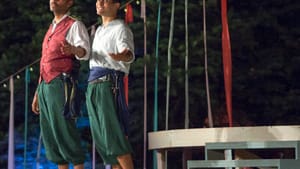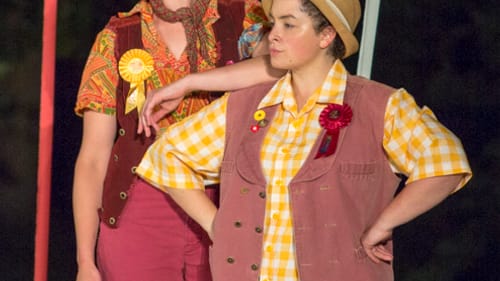Stay in the Loop
BSR publishes on a weekly schedule, with an email newsletter every Wednesday and Thursday morning. There’s no paywall, and subscribing is always free.
Whole lot of ado
Delaware Shakespeare presents 'Much Ado About Nothing'

Shakespeare packed his plays with universal themes and situations, so these days even productions of his comedies are laced with topical references. But for Delaware Shakespeare’s 16th annual summer offering, Philadelphia director Bi Jean Ngo makes her directorial debut with an effervescent Much Ado About Nothing that is sheer fun.
Much Ado is filled with characters and the usual multiple plots. Don Pedro (Eric Mills) returns to Messina after his military victory, bringing fellow soldiers Benedick (J Hernandez) and Claudio (Jo Vito Ramírez), as well as his disaffected half-brother Don John (David Pica). Hosted by Governor Leonato (Michael Fuchs), they fall into romances — Claudio with Leonato’s daughter Hero (Claris Park) and Benedick with Leonato's free-spirited niece Beatrice (Krista Apple).
Don John (a self-confessed “plain-dealing villain”) is in love only with treachery, and his plot sets out to twist the sunny romance, impugn Hero, and sidetrack her marriage to Claudio. He is comically thwarted by a troupe of inept law officers led by Dogberry (Hannah Van Sciver), and all is neatly bound up. After all, this is a comedy, and it must end happily.
A "merry war"
The title phrase, “Much ado about nothing,” has been interpreted in many ways, but Ngo sees it as aptly describing the sparring of Beatrice and Benedick, two feisty leading characters whose verbal jousts hide a fear of losing face and independence.
One of the Bard’s great couples, B and B trade barbs and jibes in a “merry war” that masks their mutual attraction and provides their friends — along with actors and audience — some of the greatest banter ever written in English.
As Beatrice, a woman who knows her own mind and is unafraid — delighted, actually — to speak it, Apple commands Shakespeare’s language and his heroine’s complexities. Hernandez plays Benedick as an elfin wag, a jester filled with puckish antics that entertain his pals and impress all with his wit.
In the first act, Ngo puts them in constant comic motion, sometimes undercutting the intricate construction of their dialogue. But these actors have forceful dramatic gifts, and in the second act (in soliloquy or in tandem) they deploy those gifts to create riveting moments that bring the full-tilt comedy to breathtaking stops.
Hero and Claudio — the other loving couple — are papier-mâché copies of the leads in many productions, but here Park and Ramírez bring specificity and brio to these traditional romantic roles. The character of Don Pedro handles a lot of exposition, plot-setting, and tricky situations, and Mills brings dash, authority and a bit of louche charm to his difficult tasks.
As Dogberry (only in the second act), Van Sciver creates an interesting character. However, her frenetic physicality and choppy diction make it a challenge to understand the brilliant malapropisms lurking in the text.

All the world's a stage
Each night, a Delaware faith leader plays Friar Francis, who comes to marry the lovers and ends up helping to resolve their dilemma. At the performance I attended, it was Dr. Todd Townsend of the Resurrection Center, who displayed surprising stageworthiness and some acting skill.
Artistic director David Stradley introduced this inspired casting idea, bringing a fresh take to each show’s ending, and new audiences into the theater. DelShakes knows how to handle a large crowd and also offers amenities: bug-spray stations, wine and food for sale, jaunty signposts, and a handy guide to outdoor seating (“Beach Chairs vs. Lawn Chairs”).
All the action occurs on Kevin Meehan’s multilevel stage backed by the park’s towering trees and festooned with streamers. His multiple playing spaces make for good viewing and facilitate flights through the woods, comic entrances, and hiding places.
Ngo pushes her actors to their comic or villainous limits and fills the show with bounce and verve, though an occasional respite would be welcome. But Dixon Li’s stagey, self-aware choreography is the evening’s least successful aspect, and much of it is unnecessary. These actors are vivacious enough to amply transmit Much Ado’s joie de vivre.
Katie Yamaguchi’s Mexican-inspired costumes and Michael Hahn’s mariachi-inspired music are integral to the production’s festival atmosphere. Hahn is also sound designer, and kudos to him — and to text coach Charlotte Northeast — for making Shakespeare’s words clear and resonant, ringing with meaning.
This being Shakespeare, things vacillate from light to dark and back again. Here, nature and staging synchronize. Night falls during intermission, and the second act — blackened by treachery and lies — mirrors the darkened sky.
Thanks to Much Ado — as in so much of Shakespeare — words have entered the lexicon, including benedict: "a bachelor who marries late in life.” When Don Pedro says, “I give you Benedick, the married man,” applause rings out through the woods, both for this unforgettable couple and for the joy in DelShakes’s lovely production.
What, When, Where
Much Ado About Nothing. By William Shakespeare, Bi Jean Ngo directed. Delaware Shakespeare. Through July 29, 2018, at Rockwood Park, 4651 Washington Street Extension, Wilmington, Delaware. (302) 415-3373 or delshakes.org.
Sign up for our newsletter
All of the week's new articles, all in one place. Sign up for the free weekly BSR newsletters, and don't miss a conversation.

 Gail Obenreder
Gail Obenreder